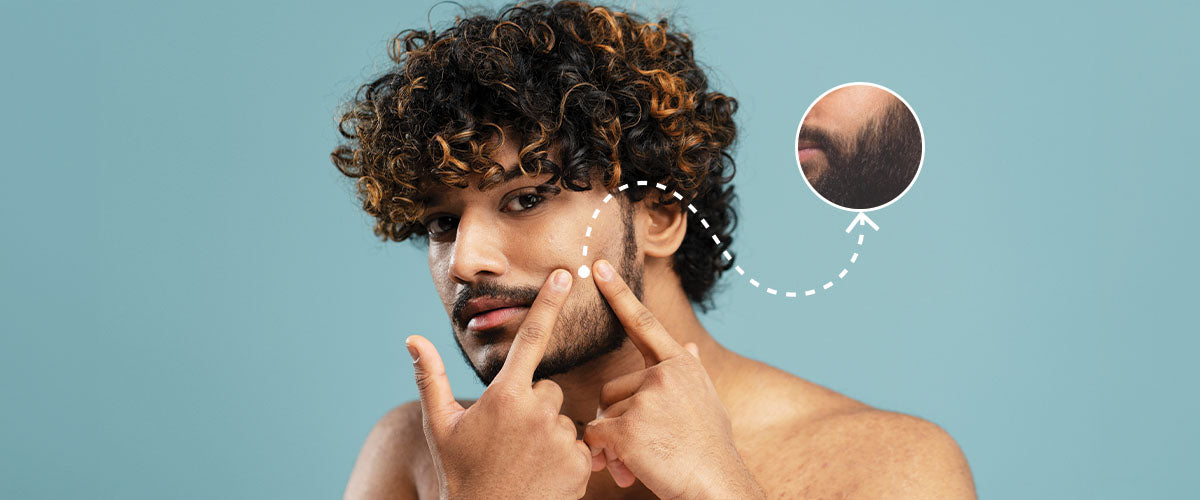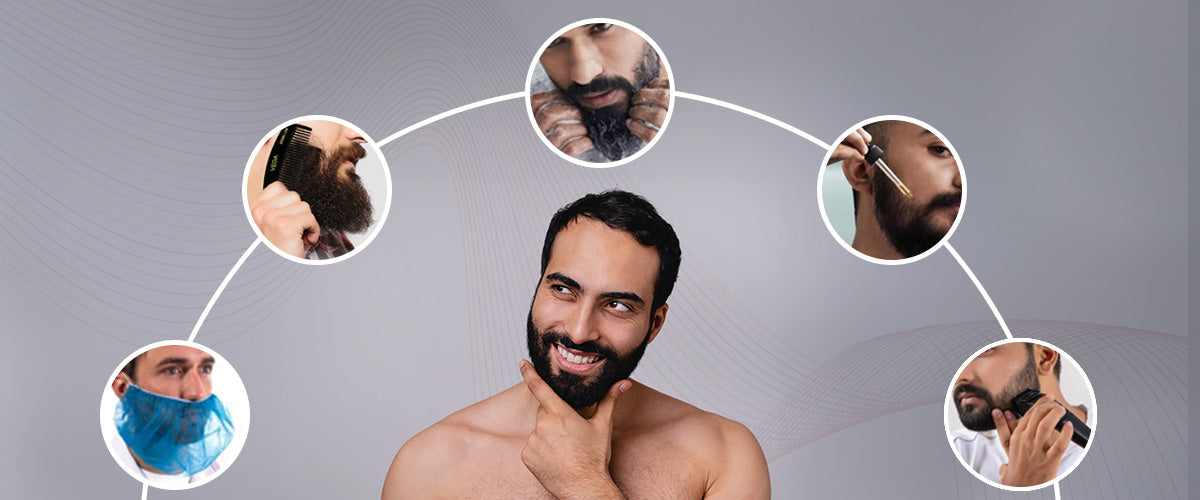Why Is My Beard Itching? How to Stop It?
Evidence Based
All the information in this blog post is accurate, trustworthy, scientifically based and has been written and fact-checked by our experts and doctors.
Our licensed nutritionists and dietitians are committed to being objective, unbiased and honest, presenting all sides of the argument.
This article includes scientific references in brackets, which are clickable links to research papers from reputable academic organizations.

Many men eagerly begin the journey of growing a beard, looking forward to the satisfaction and pride it brings. However, this rewarding process often comes with the dreaded beard itch, a common and frustrating hurdle. This discomfort can be frustrating and might even tempt you to shave it all off. But don't worry—understanding why your beard is itching and learning how to stop it can help you enjoy your beard-growing journey to the fullest.
Let's explore why beard itch occurs and how you can effectively manage and control it for a more comfortable beard-growing experience in this blog.
Itchy Beard Causes: Why is My Beard Itching?
Beard itch occurs for several reasons, especially during the initial growth phase. Identifying these causes is the first step toward relief. Here are the primary reasons behind beard itch:
1. Dry Skin and Beard Itch:
Dry skin and coarse or curly beard hair are common causes of beard itch. Cold weather, low humidity, and harsh cleansing products can strip the skin of its natural oils, leading to flakiness and irritation. Additionally, coarse or curly beard hair, especially if recently shaved or trimmed, can exacerbate discomfort by irritating the skin. To alleviate these issues, maintaining proper hydration with gentle, moisturizing products and using beard oils and conditioners to soften the hair are effective solutions.
2. Trapped Hairs and Ingrown Hairs:
As your beard grows, some hairs may curl back into the skin, causing painful ingrown hairs. These can lead to red, irritated bumps that are both itchy and uncomfortable. Ingrown hairs occur when dead skin cells block the hair follicle, forcing the hair to grow sideways under the skin.
3. Poor Hygiene Habits:
Neglecting beard hygiene can result in a buildup of dead skin cells, dirt, and bacteria. This accumulation clogs pores, causing itchiness and irritation. Regular washing and proper grooming are essential to keep the beard and the skin beneath it clean and healthy.
4. Skin Conditions
Certain skin conditions like seborrheic dermatitis, eczema, or psoriasis can cause significant itching and discomfort under the beard. These conditions often require specific treatments to manage effectively.
5. Allergic Reactions
Allergic reactions to beard care products, which may contain fragrances, preservatives, or other irritants, can lead to itchiness and discomfort. Additionally, fungal infections like ringworm can cause severe itchiness in the beard area. To avoid allergic reactions, it is crucial to patch-test new products on a small area of skin before applying them more broadly.
6. Inadequate Grooming Practices
Beard hair that is matted and tangled due to improper or infrequent care can irritate and create itching on the skin. Using a beard brush or comb can help keep the hair detangled and distribute natural oils evenly, reducing irritation.
7. Nutritional Deficiencies
A lack of essential nutrients, particularly vitamins A, E, and D, as well as omega-3 fatty acids, can cause dryness and lead to itchy skin. Maintaining a balanced diet or taking supplements can support healthy skin and hair, reducing the likelihood of itchiness.
Home Remedies for Itchy Beard: How to Stop Beard Itching?
Understanding the causes of beard itch is essential, but knowing how to address it is even more important. Here are some quick and effective solutions to stop beard itch:
1. Keep Your Beard Clean
Regular cleansing is crucial for maintaining a healthy beard. Use a gentle beard shampoo to wash away dirt, bacteria, and dead skin cells. Avoid harsh soaps that can strip natural oils from your skin and beard. Washing your beard 2-3 times a week is generally sufficient. Over-washing can lead to dryness, while under-washing can cause a build-up of dirt and bacteria.
2. Exfoliate Your Skin
Exfoliating helps remove dead skin cells that can cause itchiness. Use a gentle scrub designed for facial skin to exfoliate the skin beneath your beard. Exfoliating once or twice a week can keep your skin fresh and reduce the chances of ingrown hairs.
3. Moisturize Daily
Using a good quality beard oil or balm can keep your beard and the skin underneath hydrated. Look for products with natural ingredients like jojoba oil, argan oil, and vitamin E, which can nourish and moisturise your skin. Apply the oil or balm daily, preferably after showering when your skin and beard are still damp, to lock in moisture.
4. Trim Regularly
Regular trimming helps keep your beard neat and can prevent ingrown hairs. Use a beard trimmer or visit a barber to keep your beard in shape. Trim your beard every couple of weeks to maintain its length and prevent split ends, which can contribute to itchiness.
5. Avoid Hot Water
Washing your beard with hot water can strip away natural oils, leading to dryness and itchiness. Use lukewarm water instead to maintain moisture levels. After washing, pat your beard dry with a soft towel instead of rubbing it vigorously, which can cause further irritation.
6. Stay Hydrated
Drinking plenty of water keeps your skin and beard hydrated from the inside out. Aim for at least eight glasses of water a day to maintain healthy skin. Proper hydration supports overall skin health, making your beard-growing experience more comfortable.
7. Use Anti-Itch Creams or Oils
If your beard itch is severe, consider using anti-itch creams or oils. Products containing hydrocortisone or menthol can provide relief from intense itchiness. Apply these products as directed, and avoid overuse to prevent skin irritation.
If you're searching for the best alternative with completely natural ingredients, try ForMen Beard Growth Oil with Anti-Itch and Anti-Dandruff properties. This one-stop solution addresses all your beard concerns, offering a lightweight, Enjoy refreshing aroma while achieving a shiny, smooth, and bouncy beard free from itch and dandruff.
To use, apply at least 1 ml of the oil with the dropper, spreading it evenly with your fingertips and gently massaging it in. For best results, follow up with the ForMen Beard Comb to style your beard to perfection.
8. Maintain a Healthy Diet
A diet rich in vitamins and minerals supports healthy skin and hair. Include foods high in omega-3 fatty acids, vitamins A, C, and E, and zinc in your diet. These nutrients promote healthy skin and hair growth, reducing the likelihood of beard itch.
9. Avoid Touching Your Beard Frequently
Constantly touching or scratching your beard can transfer bacteria and dirt to your face, exacerbating itchiness. Try to keep your hands away from your beard as much as possible. If you need to touch your beard, make sure your hands are clean to avoid introducing irritants.
10. Treat Underlying Skin Conditions
If you have a skin condition like eczema or psoriasis, follow your dermatologist's advice and use prescribed treatments to manage symptoms. Treating these conditions effectively can significantly reduce beard itch and improve your overall comfort.
Growing a beard can be a rewarding experience, but beard itch can be a significant hurdle. Understanding the causes and implementing these quick and effective solutions can help you stop the itch and enjoy a healthy, well-maintained beard. Regular cleansing, moisturising, and proper beard care are key to preventing and alleviating itchiness. For an added boost, consider using ForMen Beard Growth Oil with Anti-Itch and Anti-Dandruff properties. This one-stop solution addresses all your beard concerns. Embrace the journey and wear your beard with pride!
Also Read the Articles:
- Top 15 Best Tips to Fix Patchy Beard
- Top 10 Most Effective Home Remedies to Reverse Grey Beard Naturally
- Top 10 Best Foods for Beard Growth
- Top 7 Home Remedies for Beard and Moustache Growth
| *** This Article is Written by Swetha Ramala. |
Disclaimer: The information provided on this page is not a substitute for professional medical advice, diagnosis, or treatment. If you have any questions or concerns about your health, please talk to a healthcare professional.
 Evidence Based
Evidence Based



एक टिप्पणी छोड़ें